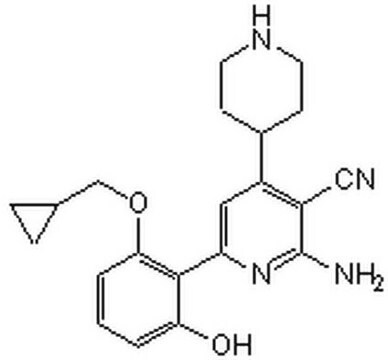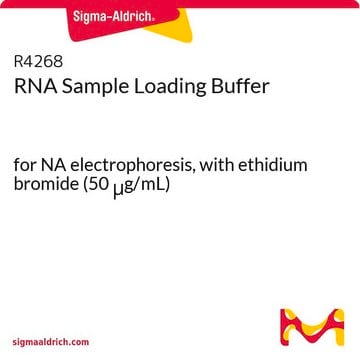P6624
PS-1145 dihydrochloride
≥98% (HPLC), solid
Synonym(s):
N-(6-Chloro-9H-pyrido[3,4-b]indol-8-yl)-3-pyridinecarboxamide dihydrochloride
About This Item
Recommended Products
Quality Level
Assay
≥98% (HPLC)
form
solid
storage condition
desiccated
color
yellow
solubility
DMSO: >3 mg/mL at ~60 °C, clear (with warming for 2 minutes)
methanol: water (1:1): ≥5 mg/mL at 60 °C (With warming for 5 minutes.)
storage temp.
2-8°C
SMILES string
Cl[H].Cl[H].Clc1cc(NC(=O)c2cccnc2)c3[nH]c4cnccc4c3c1
InChI
1S/C17H11ClN4O.2ClH/c18-11-6-13-12-3-5-20-9-15(12)21-16(13)14(7-11)22-17(23)10-2-1-4-19-8-10;;/h1-9,21H,(H,22,23);2*1H
InChI key
QTDCBADLGJZBHP-UHFFFAOYSA-N
Application
- in the culture medium to treat human epidermal keratinocytes (HEKs) and squamous carcinoma cells (SCCs) to study the role of IKK in Corynebacterium tuberculostearicum (C. t.)-elicited transcription of inflammatory mediators
- to investigate the involvement of transcription factor p65 (RelA)/nuclear factor kappa-B (NF-κB) in the cluster of differentiation 28 (CD28)-mediated interleukin-17A (IL-17A) gene expression
- to examine the involvement of NF-κB signaling in the cytotoxic effect of niclosamide on colorectal cancer (CRC) cells
Biochem/physiol Actions
Features and Benefits
Signal Word
Warning
Hazard Statements
Precautionary Statements
Hazard Classifications
Acute Tox. 4 Oral
Storage Class Code
11 - Combustible Solids
WGK
WGK 3
Flash Point(F)
Not applicable
Flash Point(C)
Not applicable
Personal Protective Equipment
Certificates of Analysis (COA)
Search for Certificates of Analysis (COA) by entering the products Lot/Batch Number. Lot and Batch Numbers can be found on a product’s label following the words ‘Lot’ or ‘Batch’.
Already Own This Product?
Find documentation for the products that you have recently purchased in the Document Library.
Our team of scientists has experience in all areas of research including Life Science, Material Science, Chemical Synthesis, Chromatography, Analytical and many others.
Contact Technical Service









